|
|
|
Sort Order |
|
|
|
Items / Page
|
|
|
|
|
|
|
| Srl | Item |
| 1 |
ID:
092362
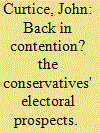

|
|
|
|
|
| Publication |
2009.
|
| Summary/Abstract |
This article assesses whether the Conservatives are likely to be serious contenders for power at the next British general election. First it assesses how well the party will have to do to 'win' the election. Second, it considers whether the record of the polls since 2005 suggests the party is capable of securing the necessary support. Third, the article assesses whether the ideological mood of the electorate has moved closer to the Conservatives since 2005. Finally it considers whether the image of the party has improved.
The Conservatives are likely to have to outpoll Labour by a considerable margin to become the largest party but their record in opinion polls suggests they could achieve this. The ideological mood of the electorate has moved closer to the party, while David Cameron is a relatively popular leader. But the party has still not fully restored its reputation for economic competence.
|
|
|
|
|
|
|
|
|
|
|
|
|
|
|
|
| 2 |
ID:
111506
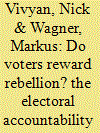

|
|
|
|
|
| Publication |
2012.
|
| Summary/Abstract |
To hold their Members of Parliament individually accountable for their legislative behaviour, British voters would need to base their decision to vote for an MP at least partially on the extent to which the MP's legislative voting behaviour deviated from that of the MP's party leadership. Voters should evaluate this deviation contingent on their views of the party leadership. MP rebellion can signal that voter-MP congruence is greater than that of the voter and the MP's party leadership. In this article it is found that only constituents with negative attitudes toward the Labour government reward rebellious Labour MPs, albeit to a limited extent. A similar conditional association is not observed on a single issue: Iraq. The policy accountability of MPs is relatively weak and general rather than issue-specific.
|
|
|
|
|
|
|
|
|
|
|
|
|
|
|
|
| 3 |
ID:
119193
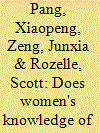

|
|
|
|
|
| Publication |
2013.
|
| Summary/Abstract |
Officials in China claim that voting rates in rural village elections are high. However, the true voting rate is lower, especially for women. We postulate that women are less likely to vote owing to insufficient knowledge about their rights. The objective of this paper is to test whether the knowledge levels of women and village leaders about women's voting rights can affect women's voting behaviour. We report on the results of a randomized controlled trial (RCT) involving 700 women in China's Fujian and Liaoning provinces. Villages were randomly assigned to either a control group or one of three intervention groups. One intervention provided voting training to women only, another provided training to both women and village leaders, and the third provided training to village leaders only. After women received training, their scores on a test of voting knowledge increased, and they more fully exercised their voting rights. When only village leaders were trained, test scores and voting behaviour were not statistically different from the control villages.
|
|
|
|
|
|
|
|
|
|
|
|
|
|
|
|
| 4 |
ID:
101202
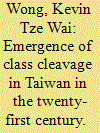

|
|
|
|
|
| Publication |
2010.
|
| Summary/Abstract |
This paper shows that, in Taiwan, political cleavage based on class (class cleavage) has developed since the beginning of the new millennium due to the increasingly important issue of cross-Strait economic integration.Class groups with more skills that benefit from this integration and the less skilledwho are harmed by it are polarized into two opposite camps.Responding to these class groups, the twomajor political camps in Taiwan incorporate this issue into their political platforms. The pan-Blue coalition urges further cross-Strait economic integration, while the pan-Green coalition holds the opposite view. Using the datasets of the Taiwan Social Change Survey (????????), this paper demonstrates that in the 2001 and 2004 legislative elections as well as in the 2004 presidential election,class groups oriented in favor of cross-Strait economic integration have allied with the pan-Blue coalition, while the opposing class groups support the pan-Green coalition.
|
|
|
|
|
|
|
|
|
|
|
|
|
|
|
|
| 5 |
ID:
191860


|
|
|
|
|
| Summary/Abstract |
Do South Africans hold strong populist attitudes? If so, who is the ‘populist citizen’ and have these attitudes been activated in the electoral arena? In this article, we make use of 2019 Comparative National Elections Project (CNEP) data to answer these questions. We find that populist attitudes tend to vary across levels of education, geographic location and racial groups. Given the constant supply of populist rhetoric from the Economic Freedom Fighters (EFF), we expected this party to marshal electoral support from citizens holding the strongest populist attitudes. However, we contend that the party's racialised populism and radicalism ultimately handicapped it at the ballot box. The EFF ultimately suffered from citizens’ mistrust, its lack of credibility and savvy political moves by the ANC ahead of the election.
|
|
|
|
|
|
|
|
|
|
|
|
|
|
|
|
| 6 |
ID:
178278


|
|
|
|
|
| Summary/Abstract |
Since the early 2000s, Japan has witnessed the growing salience of so-called netto uyoku (online right-wingers). This group is characterized by strong anti-China and anti-Korea sentiments, nationalistic political views, and online political engagement. While online radical right movements in Europe are often regarded as support bases for radical right candidates or parties, few studies have investigated whether this assumption applies to Japanese online right-wingers. The present study sought to shed light on this issue by conducting a large-scale web survey with 77,084 respondents living in the greater Tokyo metropolitan area. Respondents were registered monitors for a research company. The large sample size enabled multivariate analyses to clarify the characteristics of online right-wingers in comparison to other respondents. The results indicated that 1.5 percent of the respondents (1,167) could be classified as online right-wingers and, in contrast with the political discontent hypothesis, most online right-wingers had a high degree of external political efficacy and lower levels of populist attitudes relative to other respondents. This suggests that online right-wingers trusted and remained satisfied with the current political conditions. Furthermore, they were more likely to vote, especially for established conservative parties, suggesting an affinity among online right-wingers for traditional conservative parties and candidates. These findings indicate that, unlike in Europe, Japanese online right-wingers are not a support base for radical right candidates and parties. In Japan, which is under a right-leaning government, online right-wingers have not become a driving force for emergent radical right parties.
|
|
|
|
|
|
|
|
|
|
|
|
|
|
|
|
| 7 |
ID:
175593


|
|
|
|
|
| Summary/Abstract |
Singapore’s 2020 general election was held amidst the country’s most serious public health and economic crises in the country’s history. Despite expectations that these parallel crises would precipitate a flight to safety and result in a strong performance by the dominant People’s Action Party (PAP), the ruling party received its third lowest popular vote share (61.2%) and lowest ever seat share (89.2%) since independence. This article engages explanations for the unexpected results and argues that the vote swing against the PAP was enabled by a hitherto largely overlooked factor: the 2020 election included two opposition parties that could credibly compete with the PAP on the valence considerations that drive voting behaviour in Singapore, giving voters a perceived safe alternative to the PAP at the constituency level. Quantitative tests support the notion that party credibility—rather than demographic factors, incumbency advantages, Group Representation Constituencies, or assessments of the PAP’s fourth generation leaders—best explain variation in the vote swing against the PAP. Ultimately, the results suggest that the PAP’s monopoly on party credibility is no longer assured, thus portending greater opposition competitiveness and pressure against the PAP in future elections. Nonetheless, the PAP’s dominance remains intact and there is little evidence of a general appetite among the electorate for a non-PAP government, suggesting the likelihood of smaller course corrections rather than major steps towards democratization in the coming years.
|
|
|
|
|
|
|
|
|
|
|
|
|
|
|
|
| 8 |
ID:
145559
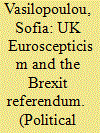

|
|
|
|
|
| Summary/Abstract |
This article shows that key to understanding the referendum outcome are factors such as a profoundly eurosceptic public, high levels of citizen uncertainty, divided mainstream political parties on the EU and lack of unity within the ‘Leave’ campaign. The Brexit referendum is more than just about domestic issues and government approval. Utilitarian concerns related to economic evaluations of EU integration coupled with support of or opposition to EU freedom of movement are very likely to influence vote choice. Those campaigns that focus on rational utilitarian arguments about the costs and benefits related to EU membership as a whole but also to EU freedom of movement are expected to swing voters.
|
|
|
|
|
|
|
|
|
|
|
|
|
|
|
|
|
|
|
|
|